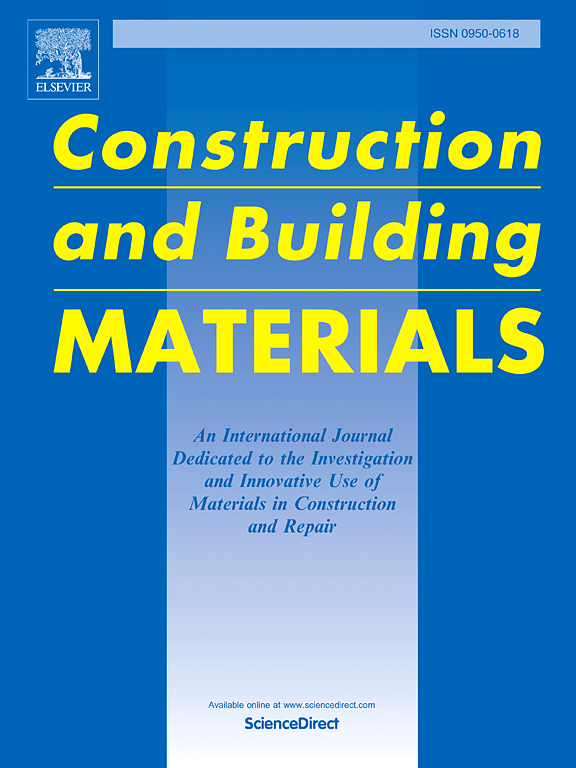活性增强核壳微胶囊沥青砂浆自愈性能的制备与研究
IF 8
1区 工程技术
Q1 CONSTRUCTION & BUILDING TECHNOLOGY
引用次数: 0
摘要
微胶囊技术积极修复沥青路面微裂缝,延长其使用寿命。本研究开发了多愈合核-壳微胶囊,由核(含有葵花籽油的聚脲甲醛亚胶囊)和壳(海藻酸钙胶囊)组成,提供保护并使其延迟释放。扫描电镜(SEM)结果表明,微胶囊的腔室分布均匀,平均直径约为2 mm。岩心含量和包封效率分别为65.38 %和78.52 %,壳的平均硬度为0.27 GPa。热重分析表明,微胶囊可以承受高达230℃的高温。通过多次自修复试验,研究表明,核壳微胶囊对沥青具有持续、重复的修复作用,其在沥青砂浆中的最佳掺量为1.5 wt%。愈伤效果随愈伤剂量、愈伤时间和愈伤温度的增加而提高。微胶囊不断释放回复性剂,修复裂缝,提高沥青性能。本文章由计算机程序翻译,如有差异,请以英文原文为准。
Active-enhanced core-shell microcapsules for self-healing properties of asphalt mortar: Preparation and performance research
Microcapsule technology actively repairs microcracks in asphalt pavement, extending its service life. This study develops multi-healing core-shell microcapsules consisting of a core (polyurea formaldehyde sub-capsules containing sunflower oil) and a shell (calcium alginate capsule) that provides protection and enables delayed release. Scanning electron microscopy (SEM) results show the microcapsules have evenly distributed chambers with an average diameter of approximately 2 mm. The core content and encapsulation efficiency are measured at 65.38 % and 78.52 %, respectively, while the shell exhibits an average hardness of 0.27 GPa. Thermogravimetric analysis indicates the microcapsules can withstand high temperatures up to 230℃. Through multiple self-healing tests, the study demonstrates that the core-shell microcapsules provide sustainable and repeated repair effects on asphalt, with an optimal dosage of 1.5 wt% in asphalt mortar. The self-healing effect improves with increasing dosage, healing time, and healing temperature. The microcapsules continuously release rejuvenator, repairing cracks and enhancing asphalt performance.
求助全文
通过发布文献求助,成功后即可免费获取论文全文。
去求助
来源期刊

Construction and Building Materials
工程技术-材料科学:综合
CiteScore
13.80
自引率
21.60%
发文量
3632
审稿时长
82 days
期刊介绍:
Construction and Building Materials offers an international platform for sharing innovative and original research and development in the realm of construction and building materials, along with their practical applications in new projects and repair practices. The journal publishes a diverse array of pioneering research and application papers, detailing laboratory investigations and, to a limited extent, numerical analyses or reports on full-scale projects. Multi-part papers are discouraged.
Additionally, Construction and Building Materials features comprehensive case studies and insightful review articles that contribute to new insights in the field. Our focus is on papers related to construction materials, excluding those on structural engineering, geotechnics, and unbound highway layers. Covered materials and technologies encompass cement, concrete reinforcement, bricks and mortars, additives, corrosion technology, ceramics, timber, steel, polymers, glass fibers, recycled materials, bamboo, rammed earth, non-conventional building materials, bituminous materials, and applications in railway materials.
 求助内容:
求助内容: 应助结果提醒方式:
应助结果提醒方式:


